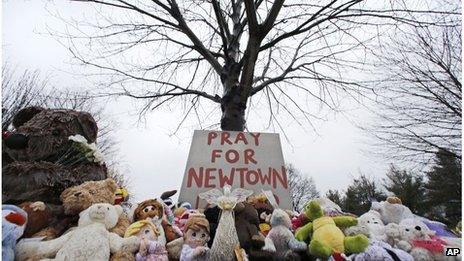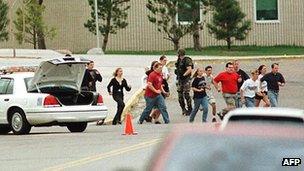Viewpoints: Should Newtown prompt US gun laws change?
- Published

As the debate begins over whether to reform US gun laws in the wake of a mass shooting at a school in Newtown, Connecticut, public figures, activists and those affected are starting to speak out on the issue.
Gary Kleck, Florida State University criminologist
I don't know of any policies that would prevent this kind of thing. The killers in these mass killings are willing to commit the crime knowing full well they'll be caught and spend the rest of their lives in prison [or get the death penalty]. Or they are willing to kill themselves - as in the Connecticut case - or they allow themselves to be shot by police.
This is a person who is willing to die in order to kill large numbers of people. Almost everyone who commits a mass shooting planned it for hours or sometimes weeks - or in the case of Columbine, a year. They're going to be able and willing to do more to evade legal controls.
If you can block a less-motivated person who is only going to be motivated to get a gun for a short period of time, that's going to be an easier task than preventing someone who is motivated to kill large numbers of people.
We can improve the background checks in two ways. Currently the federal background check only applies to gun dealers. If you buy a gun from a private source there is no federal requirement for a federal background check.
In most of the US if you buy a gun from a friend or relative you're not subject to a background check.
Currently, the law says you can't sell a gun [to a mentally ill person] and a mentally ill person can't buy a gun. But in practice the background checks don't work that well because the records are radically incomplete.
Joe Scarborough, TV host and ex-Republican congressman
Politicians can no longer be allowed to defend the status quo. They must, instead, be forced to defend our children. Parents can no longer take "no" for an answer from Washington when the topic turns to protecting our children.
The violence we see spreading from shopping malls in Oregon, to movie theatres in Colorado, to college campuses in Virginia, to elementary schools in Connecticut - it's being spawned by the toxic brew of a violent popular culture, a growing mental health crisis and the proliferation of combat-styled weapons.
I say good luck to the gun lobbyist, good luck to the Hollywood lawyer, who tries to blunt the righteous anger of millions of parents by hiding behind twisted readings of our Bill of Rights.
Our government rightly obsesses, day and night, on how to prevent the next 9/11 from being launched from a cave in Afghanistan, or a training base in Yemen, but perhaps - just perhaps - now is the time they start obsessing on how to stop the next attack on a movie theatre, or in a shopping mall, or a college campus, or in our children's first grade classes.
Joe Scarborough was speaking on his show, Morning Joe on MSNBC, external.
New York City Mayor Michael Bloomberg
Michael Bloomberg said the massacre at Sandy Hook was "no aberration" and called gun violence a "national tragedy"
First, Congress should pass the Fix Gun Checks Act, which would close the "private sale loophole" that allows more than 40% of gun sales to go through without a background check. It would require every gun buyer to pass a background check.
The majority of gun sales already go through the background check system, and it's neither onerous nor intrusive, nor does it infringe on anyone's rights.
This bill would also require states and the federal government to send all necessary records on felons, domestic abusers, the seriously mentally ill, and other dangerous people to the National Instant Criminal Background Check System.
Second, it is time to pass an enforceable and effective assault weapons ban - one that isn't riddled with loopholes and easy evasion. A previous ban expired in 2004, and even though President Bush supported reinstating it, Congress never acted. That must change.
Congress should also ban the high-capacity magazines that have been used again and again in these mass shootings. These weapons and ammunition can be used to kill large numbers of people quickly, and regulating them certainly falls within the bounds of the Second Amendment.
And third, the president and Congress should work together to make gun trafficking a felony - as Senator Kirsten Gillibrand, Congresswoman Carolyn Maloney, and others have proposed.
This legislative package would make it harder for criminals, drug abusers, minors, and the mentally ill to get guns, and harder for them to inflict the level of carnage that we saw this weekend.
It's not a panacea, it wouldn't get rid of all the guns on the streets, but it would go a long way towards limiting them and limiting the number of people killed.
Michael Bloomberg spoke publicly at City Hall in New York.
Richard Feldman, Independent Firearm Owners Association
What is the government planning to do? Come and get the guns? I don't think so - it would be unconstitutional at this point. Our Supreme Court has already ruled on this issue.
It's not going to play in the US. The gun-owning community is not prepared to give up their firearm freedoms because a few individuals misuse those freedoms.
When we start looking at guns, we miss the opportunity to focus on the problem. In whose hands are the guns? This particular problem, and all the other mass shootings, involve clearly mentally deranged individuals.
We have a failed mental health system now in this country, and if we don't put resources into getting at these people before they commit such horrible acts we're not going to solve this problem.
I hope things do change. There is a lot of things that we could do, we could do better.
We can talk about the "gun show so-called loophole" [allowing purchases without a background check] but that's not where criminals obtain the majority of their guns, even very few.
I wouldn't do anything particularly on the gun laws. I would focus, if we're dealing with mentally deranged individuals, on our mental health system.
We can't incarcerate people, we can't take them off the streets until they actually do something that's dangerous.
Well, it's too late when they've already committed murder or killed themselves, if we can't help them beforehand. And our laws prevent us from helping them.
Beth Nimmo, mother of Columbine shooting victim

Children fled Columbine High School after two teenagers shot and killed 12 students and a teacher
There are probably going to be some major modifications made [to gun laws]. I am a firm believer in our constitutional rights so I don't believe that Americans should give up guns. I don't think there should be a ban on all guns.
I think maybe a partial ban on certain kinds of handguns, and I'm also for training people in school - principals and administrative people that would want [to carry guns].
I'm OK with the fact that they want to have a concealed weapon, in case anybody did come into their school. Teachers would have a way to defend their students and themselves.
This is getting pretty grim that anybody can walk on a campus and there is no protection for those who are in the school themselves.
Gary Kleck, Richard Feldman and Beth Nimmo were speaking to the BBC